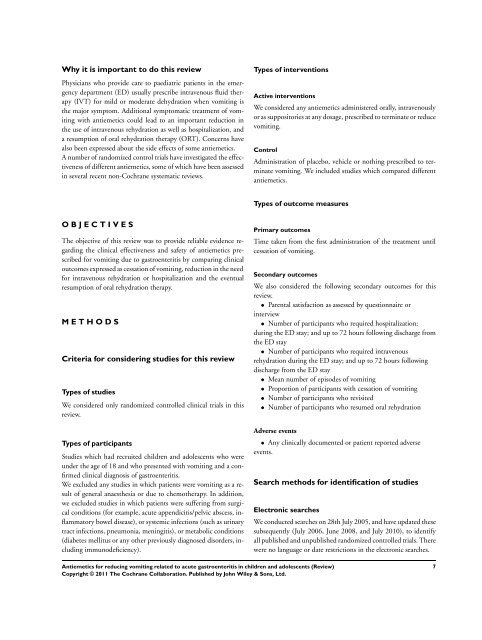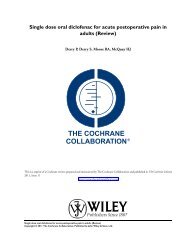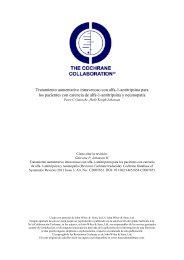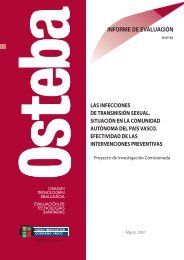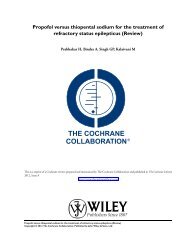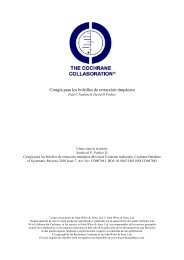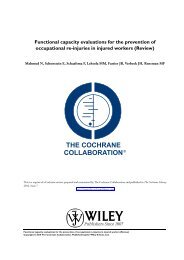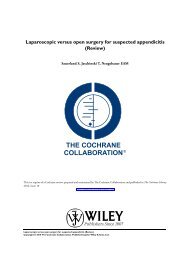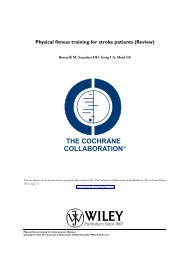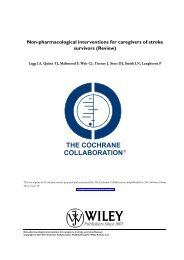Antiemetics for reducing vomiting related to acute ... - Update Software
Antiemetics for reducing vomiting related to acute ... - Update Software
Antiemetics for reducing vomiting related to acute ... - Update Software
You also want an ePaper? Increase the reach of your titles
YUMPU automatically turns print PDFs into web optimized ePapers that Google loves.
Why it is important <strong>to</strong> do this review<br />
Physicians who provide care <strong>to</strong> paediatric patients in the emergency<br />
department (ED) usually prescribe intravenous fluid therapy<br />
(IVT) <strong>for</strong> mild or moderate dehydration when <strong>vomiting</strong> is<br />
the major symp<strong>to</strong>m. Additional symp<strong>to</strong>matic treatment of <strong>vomiting</strong><br />
with antiemetics could lead <strong>to</strong> an important reduction in<br />
the use of intravenous rehydration as well as hospitalization, and<br />
a resumption of oral rehydration therapy (ORT). Concerns have<br />
also been expressed about the side effects of some antiemetics.<br />
A number of randomized control trials have investigated the effectiveness<br />
of different antiemetics, some of which have been assessed<br />
in several recent non-Cochrane systematic reviews.<br />
O B J E C T I V E S<br />
The objective of this review was <strong>to</strong> provide reliable evidence regarding<br />
the clinical effectiveness and safety of antiemetics prescribed<br />
<strong>for</strong> <strong>vomiting</strong> due <strong>to</strong> gastroenteritis by comparing clinical<br />
outcomes expressed as cessation of <strong>vomiting</strong>, reduction in the need<br />
<strong>for</strong> intravenous rehydration or hospitalization and the eventual<br />
resumption of oral rehydration therapy.<br />
M E T H O D S<br />
Criteria <strong>for</strong> considering studies <strong>for</strong> this review<br />
Types of studies<br />
We considered only randomized controlled clinical trials in this<br />
review.<br />
Types of participants<br />
Studies which had recruited children and adolescents who were<br />
under the age of 18 and who presented with <strong>vomiting</strong> and a confirmed<br />
clinical diagnosis of gastroenteritis.<br />
We excluded any studies in which patients were <strong>vomiting</strong> as a result<br />
of general anaesthesia or due <strong>to</strong> chemotherapy. In addition,<br />
we excluded studies in which patients were suffering from surgical<br />
conditions (<strong>for</strong> example, <strong>acute</strong> appendicitis/pelvic abscess, inflamma<strong>to</strong>ry<br />
bowel disease), or systemic infections (such as urinary<br />
tract infections, pneumonia, meningitis), or metabolic conditions<br />
(diabetes mellitus or any other previously diagnosed disorders, including<br />
immunodeficiency).<br />
Types of interventions<br />
Active interventions<br />
We considered any antiemetics administered orally, intravenously<br />
or as supposi<strong>to</strong>ries at any dosage, prescribed <strong>to</strong> terminate or reduce<br />
<strong>vomiting</strong>.<br />
Control<br />
Administration of placebo, vehicle or nothing prescribed <strong>to</strong> terminate<br />
<strong>vomiting</strong>. We included studies which compared different<br />
antiemetics.<br />
Types of outcome measures<br />
Primary outcomes<br />
Time taken from the first administration of the treatment until<br />
cessation of <strong>vomiting</strong>.<br />
Secondary outcomes<br />
We also considered the following secondary outcomes <strong>for</strong> this<br />
review.<br />
• Parental satisfaction as assessed by questionnaire or<br />
interview<br />
• Number of participants who required hospitalization:<br />
during the ED stay; and up <strong>to</strong> 72 hours following discharge from<br />
the ED stay<br />
• Number of participants who required intravenous<br />
rehydration during the ED stay; and up <strong>to</strong> 72 hours following<br />
discharge from the ED stay<br />
• Mean number of episodes of <strong>vomiting</strong><br />
• Proportion of participants with cessation of <strong>vomiting</strong><br />
• Number of participants who revisited<br />
• Number of participants who resumed oral rehydration<br />
Adverse events<br />
• Any clinically documented or patient reported adverse<br />
events.<br />
Search methods <strong>for</strong> identification of studies<br />
Electronic searches<br />
<strong>Antiemetics</strong> <strong>for</strong> <strong>reducing</strong> <strong>vomiting</strong> <strong>related</strong> <strong>to</strong> <strong>acute</strong> gastroenteritis in children and adolescents (Review)<br />
Copyright © 2011 The Cochrane Collaboration. Published by John Wiley & Sons, Ltd.<br />
We conducted searches on 28th July 2005, and have updated these<br />
subsequently (July 2006, June 2008, and July 2010), <strong>to</strong> identify<br />
all published and unpublished randomized controlled trials. There<br />
were no language or date restrictions in the electronic searches.<br />
7


